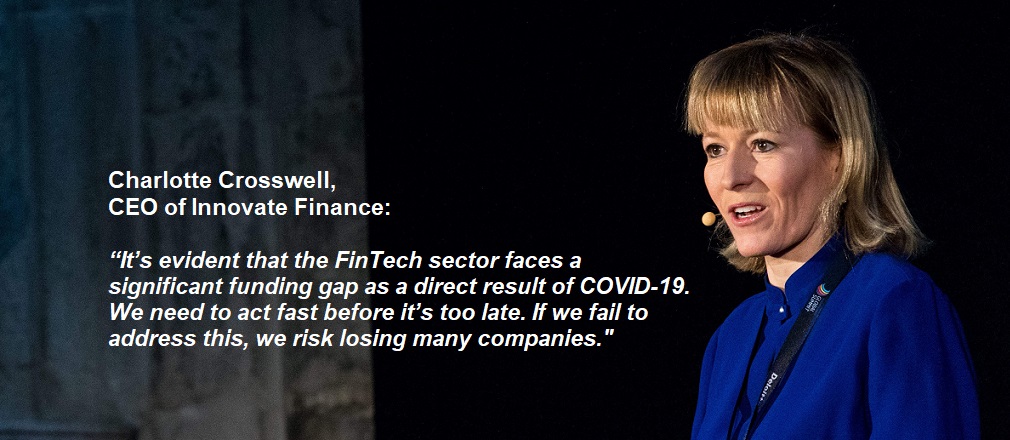
Some of the smallest UK FinTech companies have a cash runway of six months or less, according to a Innovate Finance recent survey on the impact of COVID-19 on the industry.
The survey has revealed that over 75% of smaller FinTech companies are worried about the next funding round, with over 70% of all respondents having received no private funding since the start of lockdown.
Over three-quarters of FinTech start-ups with 25 employees or fewer are turning to Government for funding support – having applied or intending to apply for one of the newly formed support programmes designed to keep businesses on their feet amidst the COVID-19 crisis.
Key findings also included:
– Difference between big and small – Smaller FinTech companies, defined as having 25 or fewer employees, are most at risk from the impact of Covid-19. Larger FinTech companies, with 100+ employees, are less worried about funding, although 30% expressed concern. Just under 80% of larger FinTech have a runway of 12 months or more.
– Pivoting in crisis – 60% of businesses are looking at adapting their strategy in order to survive the crisis and grow in the future. Most are considering diversifying their revenue (32%) or pivoting the business (30%), while 11% are looking at closing or mothballing the business.
– Investment trends too early to analyse – Over 70% of FinTech responding haven’t received funding during the crisis. For the FinTechs that have attracted private funding during the crisis, Angel investors have been the most common source (10%). Smaller companies have had an even greater reliance on Angels, with half (50%) receiving investment in this way. Other forms of investment included institutional or corporate VC (4%), VC (3%), Private equity (2%) and Family office (2%).
Many of the surveyed startups flagged that current Government funding programmes are unsuitable for early stage FinTechs – categorised as pre-seed and seed funding rounds. The existing Government support schemes do not incorporate the EIS/SEIS programmes – tax relief schemes designed to encourage investment in small unlisted companies.
Funds flowing into UK FinTech hit record levels in 2019, rising 38% to $4.9 billion. Investment in the first quarter of 2020 was $1.1 billion, down from $1.74 billion in Q1 2019. 50% of investment into UK FinTech companies has originated from overseas investors in previous years.
It remains to be seen whether this trend will continue through the year, although investors have said previously that they remained relatively upbeat. This is generally linked to the belief that digital adoption of financial services would quicken as a result of the crisis.
According to the analysis, there is a significant risk of the sector losing a large number of startup companies. The growing funding gap will need to be bridged if the sector is to fulfil its potential to transform the UK economy and boost financial wellbeing as the country emerges from the crisis.
###
This online questionnaire was carried out between June 2 – 14, 2020. This was distributed across the UK FinTech sector from Innovate Finance, Tech Nation and the FinTech National Network. 126 companies responded.
Banking 4.0 – „how was the experience for you”
„To be honest I think that Sinaia, your conference, is much better then Davos.”
Many more interesting quotes in the video below: